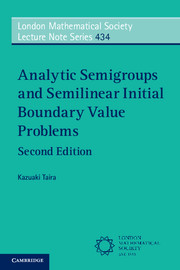Book contents
- Frontmatter
- Dedication
- Contents
- Preface to the Second Edition
- Preface to the First Edition
- 1 Introduction and Main Results
- 2 Preliminaries from Functional Analysis
- 3 Theory of Analytic Semigroups
- 4 Sobolev Imbedding Theorems
- 5 Lp Theory of Pseudo-Differential Operators
- 6 Lp Approach to Elliptic Boundary Value Problems
- 7 Proof of Theorem 1.1
- 8 Proof of Theorem 1.2
- 9 Proof of Theorems 1.3 and 1.4
- Appendix A The Laplace Transform
- Appendix B The Maximum Principle
- Appendix C Vector Bundles
- References
- Index
2 - Preliminaries from Functional Analysis
Published online by Cambridge University Press: 05 April 2016
- Frontmatter
- Dedication
- Contents
- Preface to the Second Edition
- Preface to the First Edition
- 1 Introduction and Main Results
- 2 Preliminaries from Functional Analysis
- 3 Theory of Analytic Semigroups
- 4 Sobolev Imbedding Theorems
- 5 Lp Theory of Pseudo-Differential Operators
- 6 Lp Approach to Elliptic Boundary Value Problems
- 7 Proof of Theorem 1.1
- 8 Proof of Theorem 1.2
- 9 Proof of Theorems 1.3 and 1.4
- Appendix A The Laplace Transform
- Appendix B The Maximum Principle
- Appendix C Vector Bundles
- References
- Index
Summary
The purpose of this preparatory chapter is to present fundamental results from functional analysis such as quasinormed and normed linear spaces and closed and continuous (bounded) linear operators between Banach spaces. Sections 2.1 through 2.4 are devoted to a summary of the basic definitions and results about topological spaces, quasinormed and normed linear spaces which will be used throughout the book. Most of the material will be quite familiar to the reader and may be omitted. In Section 2.5 we formulate three pillars of functional analysis – Banach's open mapping theorem, Banach's closed graph theorem and Banach's closed range theorem for closed operators in Banach spaces (Theorems 2.25, 2.26 and 2.29). In Section 2.6 we give two criteria for a closed subspace to be complemented in a Banach space (Theorem 2.31).
Section 2.7 is devoted to the Riesz–Schauder theory for compact operators. More precisely, for a compact operator T in Banach spaces, the eigenvalue problem can be treated fairly completely in the sense that the classical theory of Fredholm integral equations may be extended to the linear functional equation
Tx – λx = y
with a complex parameter λ (Theorem 2.36). In Section 2.8 we state important properties of Fredholm operators (Theorems 2.37 through 2.41). Moreover, we prove a very useful criterion for Fredholm operators due to Peetre (Theorem 2.42). Section 2.9 is devoted to a review of standard topics in the Hilbert space setting such as the Riesz representation theorem (Theorem 2.47), the Gram–Schmidt orthogonalization (Theorem 2.49) and adjoint operators (transpose operators in the Hilbert space setting). In the last Section 2.10 we present the Hilbert–Schmidt theory (Theorem 2.56) which generalizes the spectral theorem in the finite dimensional case to the Hilbert space case.
The presentation here is intended as a reference rather than a systematic exposition. The material in this chapter is standard and can be found in textbooks on functional analysis such as Folland [15], Friedman [17] and Yosida [75], and also Gohberg–Kreĭn [25].
Linear operators and functionals
Let X, Y be linear spaces over the same scalar field K.
- Type
- Chapter
- Information
- Publisher: Cambridge University PressPrint publication year: 2016



